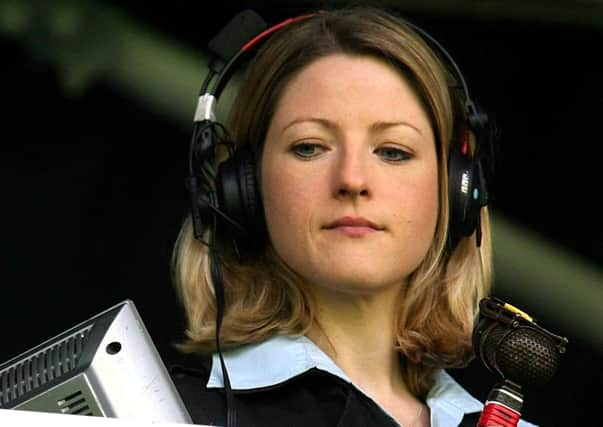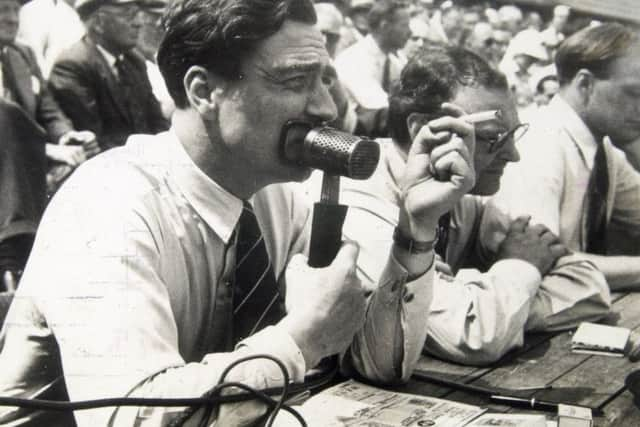The art of sport commentary over the airwaves


The first ever commentary of a football league match was broadcast on January 22, 1927, from a tiny hut in north London.
By today’s hi-tech digital standards this would have been primitive to say the least, but for listeners of the BBC’s fledgling radio service it was a life-changing event. For the first time football fans had the chance to hear running commentary from the comfort of their own homes.
Advertisement
Hide AdAdvertisement
Hide AdThe Division One clash between Arsenal and Sheffield United provided the entertainment as people eagerly tuned in to their radio sets. Such was the clamour of excitement surrounding the coverage that a BBC producer devised a plan of the pitch divided into eight numbered squares, which was published in the Radio Times.


The honour of commentating on the match fell to Henry Blythe Thornhill Wakelam, a former rugby union player, who described the action while a voice in the background mentioned the square the play was happening in.
Wakelam was the leading commentator of his generation but despite his high-profile at the time – he was described by the late John Arlott as “a natural talker” – he has long since slipped from popular memory, but the radio commentary he helped to pioneer is still very much with us.
By the end of 1927, commentary of major sporting events including the Grand National, the Boat Race, the FA Cup final and Wimbledon, were being broadcast as the wheels of a broadcasting revolution began to turn.
Advertisement
Hide AdAdvertisement
Hide AdBBC Radio 5 Live is marking this anniversary with a programme celebrating 90 years of sports commentary, looking back at great moments from the past with the likes of John Murray and Mike Costello discussing what makes a great commentary.


Part of the allure of radio is that it offers familiarity in an ever-changing world. Stories abound of cricket fans watching matches on TV with the sound switched off while they listened to the dulcet tones of Brian Johnston and Henry Blofeld on Test Match Special in years gone by.
At its best radio commentary can add colour and gravitas to moments of sporting greatness, such as Diego Maradona’s wonder goal against England in the 1986 World Cup Quarter Final, described here by Bryon Butler: “Maradona, turns like a little eel, he comes away from trouble, little squat man... comes inside Butcher, leaves him for dead, outside Fenwick, leaves him for dead, and puts the ball away... and that is why Maradona is the greatest player in the world”.
Jacqui Oatley cut her teeth as a Radio Leeds reporter before going on to become the first female Match of the Day commentator a decade ago.
Advertisement
Hide AdAdvertisement
Hide AdShe says with TV the viewers can see the action but with radio the listeners are more reliant on the person commentating. “You’re painting pictures,” says Oatley. “It’s about choosing the best words in that moment and it’s about knowing when to speak and when not to speak,” she says. “You can’t speak at 100mph, it’s all about waiting for the right moment rather than just describing everything.”
Having worked on both sides of the fence so to speak, which does she enjoy more? “I prefer radio because it’s a more relaxed environment and it’s more conversational, whereas TV commentary can be a bit more serious.”
But is radio commentary as important as it once was in the past? “Probably not, but it is still important. Not everyone supports Man United or Arsenal and if you support a smaller club you depend on local radio, which is much under-rated, for commentary of the games, so ‘yes’ it does still matter to people.”
BBC Football commentator John Murray says part of the appeal of commentating is not knowing what’s going to happen. “There’s a touch of theatre about it. It’s like an unscripted performance because there’s always something that takes you by surprise. You never do the perfect commentary, it’s like playing the game.”
Advertisement
Hide AdAdvertisement
Hide AdThe skill, he believes, is not only in relaying the action on the pitch but also looking for something unusual to keep the listener interested. “When someone like Ronaldo’s playing it’s brilliant because there’s so many things he does that you can describe to help you create those pictures.”
It’s also about keeping it simple. “You must never forget that the most important thing is the match itself that’s why people are listening in the first place. But what I love about radio commentary is the fact that I can take you anywhere I want and I think that’s a big appeal for a lot of people.”
Arguably one of the finest pieces of radio commentary came out of tragedy when the brilliant, and much missed, Peter Jones finished his last report for Radio 2 from Hillsborough on the day of the disaster in 1989, signing off with the words “and the sun shines now”.
It was a deeply moving piece of reportage from a master commentator. “What he said was very simple, but there’s also great detail and it’s a good example of how sometimes simple language can be incredibly powerful.”
90 Years of BBC Radio Sport Commentary, 5 Live Sport, tonight at 7.30pm.